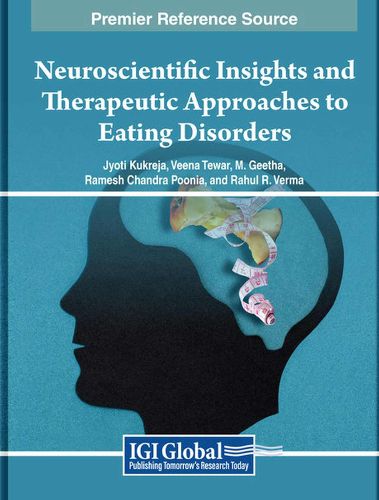Readings Newsletter
Become a Readings Member to make your shopping experience even easier.
Sign in or sign up for free!
You’re not far away from qualifying for FREE standard shipping within Australia
You’ve qualified for FREE standard shipping within Australia
The cart is loading…






This title is printed to order. This book may have been self-published. If so, we cannot guarantee the quality of the content. In the main most books will have gone through the editing process however some may not. We therefore suggest that you be aware of this before ordering this book. If in doubt check either the author or publisher’s details as we are unable to accept any returns unless they are faulty. Please contact us if you have any questions.
In the complex landscape of binge eating disorders, a pervasive and intricate challenge unfolds. Binge eating, characterized by Binge eating disorders, is a difficult challenge that requires a nuanced understanding of the underlying neuroscientific mechanisms for effective prevention and intervention strategies. There is a pressing need to bridge the gap between cutting-edge neuroscientific research and the evolving therapeutic landscape. To address this, our groundbreaking book is tailored for academic scholars in the neuroscientific community. We offer a transformative journey into the heart of binge eating disorders, unraveling the mysteries that govern neural circuits, genetic factors, hormonal imbalances, and more. Neuroscientific Insights and Therapeutic Approaches to Eating Disorders is a beacon for researchers, clinicians, and mental health professionals seeking to deepen their comprehension of eating disorders. It addresses the present-day challenges posed by binge eating and presents a roadmap for future research and clinical applications. This comprehensive resource synthesizes the latest findings in neuroscience with innovative therapeutic approaches, ultimately paving the way for improved outcomes. Episodes of excessive food consumption and loss of control demand a nuanced understanding of the underlying neuroscientific mechanisms for effective prevention and intervention strategies. Our present reality is marked by a pressing need to bridge the gap between cutting-edge neuroscientific research and the evolving therapeutic landscape. The intricate relationship between the brain and eating disorders calls for a comprehensive resource that not only dissects the neurobiological foundations but also illuminates the path toward innovative therapeutic approaches. This book, meticulously tailored for academic scholars in the neuroscientific community. The book provides a transformative journey into the heart of binge eating disorders, uncovering the mysteries that govern neural circuits, genetic factors, hormonal imbalances, and more. Through a multidisciplinary lens, this book navigates the complex terrain of the brain, providing a state-of-the-art overview of the current neuroscientific landscape. From neurotransmitters' role to environmental factors' impact, each chapter contributes to a holistic understanding of the intricate interplay between the mind and disordered eating behaviors. Practical applications of neuroscientific knowledge in clinical settings are discussed, offering tangible tools to enhance therapeutic practices.
$9.00 standard shipping within Australia
FREE standard shipping within Australia for orders over $100.00
Express & International shipping calculated at checkout
This title is printed to order. This book may have been self-published. If so, we cannot guarantee the quality of the content. In the main most books will have gone through the editing process however some may not. We therefore suggest that you be aware of this before ordering this book. If in doubt check either the author or publisher’s details as we are unable to accept any returns unless they are faulty. Please contact us if you have any questions.
In the complex landscape of binge eating disorders, a pervasive and intricate challenge unfolds. Binge eating, characterized by Binge eating disorders, is a difficult challenge that requires a nuanced understanding of the underlying neuroscientific mechanisms for effective prevention and intervention strategies. There is a pressing need to bridge the gap between cutting-edge neuroscientific research and the evolving therapeutic landscape. To address this, our groundbreaking book is tailored for academic scholars in the neuroscientific community. We offer a transformative journey into the heart of binge eating disorders, unraveling the mysteries that govern neural circuits, genetic factors, hormonal imbalances, and more. Neuroscientific Insights and Therapeutic Approaches to Eating Disorders is a beacon for researchers, clinicians, and mental health professionals seeking to deepen their comprehension of eating disorders. It addresses the present-day challenges posed by binge eating and presents a roadmap for future research and clinical applications. This comprehensive resource synthesizes the latest findings in neuroscience with innovative therapeutic approaches, ultimately paving the way for improved outcomes. Episodes of excessive food consumption and loss of control demand a nuanced understanding of the underlying neuroscientific mechanisms for effective prevention and intervention strategies. Our present reality is marked by a pressing need to bridge the gap between cutting-edge neuroscientific research and the evolving therapeutic landscape. The intricate relationship between the brain and eating disorders calls for a comprehensive resource that not only dissects the neurobiological foundations but also illuminates the path toward innovative therapeutic approaches. This book, meticulously tailored for academic scholars in the neuroscientific community. The book provides a transformative journey into the heart of binge eating disorders, uncovering the mysteries that govern neural circuits, genetic factors, hormonal imbalances, and more. Through a multidisciplinary lens, this book navigates the complex terrain of the brain, providing a state-of-the-art overview of the current neuroscientific landscape. From neurotransmitters' role to environmental factors' impact, each chapter contributes to a holistic understanding of the intricate interplay between the mind and disordered eating behaviors. Practical applications of neuroscientific knowledge in clinical settings are discussed, offering tangible tools to enhance therapeutic practices.